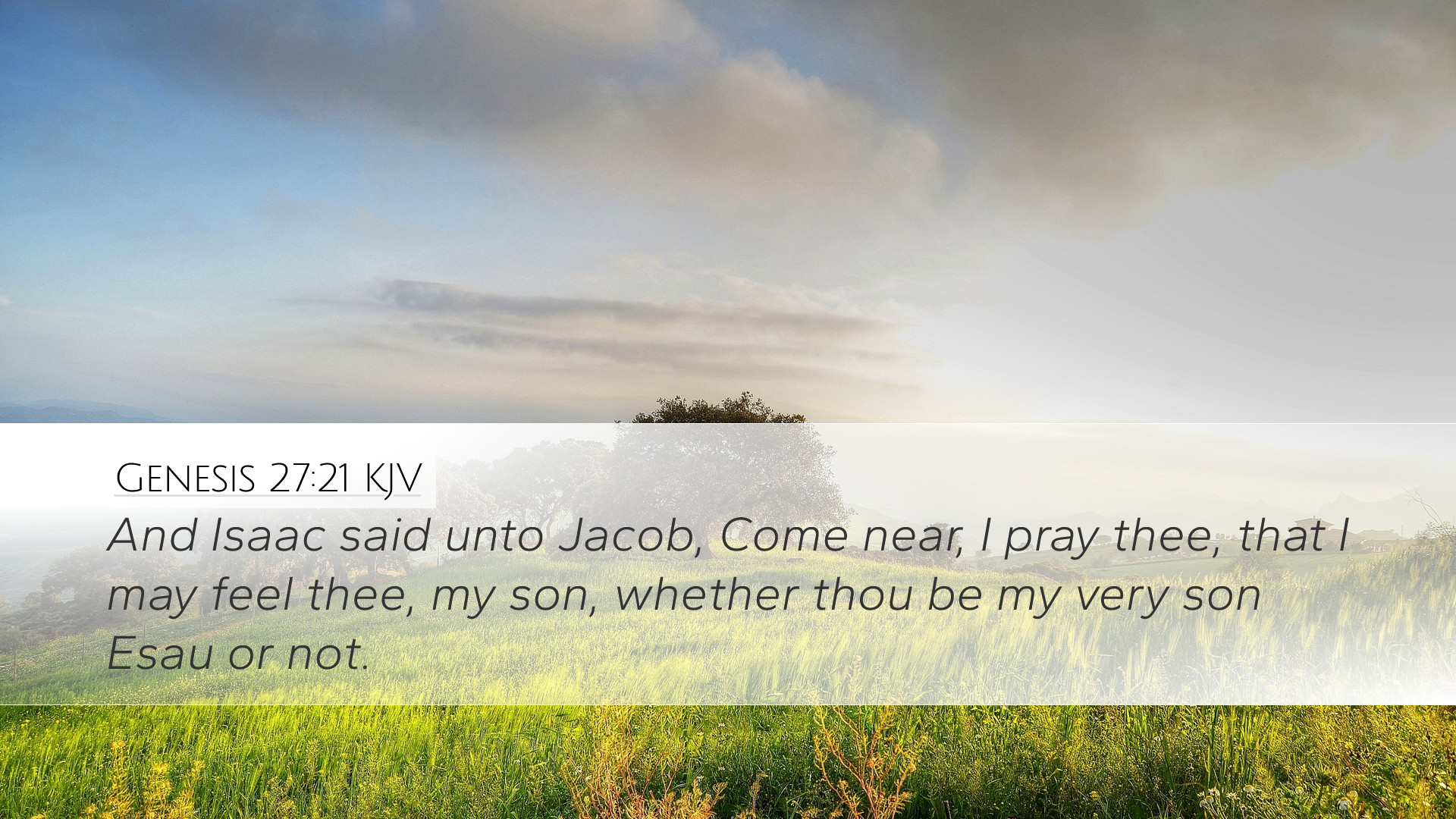Genesis 27:21 Commentary
Verse: "And Isaac said unto Jacob, Come near, I pray thee, that I may feel thee, my son, whether thou be my very son Esau or not."
Contextual Overview
This verse is situated in a narrative that illustrates the dynamics of family and deception within the biblical patriarchal context. Isaac's intention to bless Esau, his favorite son, sets the stage for a chain of events leading to Jacob receiving the blessing through cunning and manipulation.
Insights from Matthew Henry
Matthew Henry highlights the importance of the blessing within the family dynamics, noting that Isaac's physical blindness symbolizes spiritual blindness as he is deceived regarding his sons' identities. He comments on the frailty of human beings, as Isaac, despite having received divine revelations, acts under the influence of earthly considerations—his love for food and preference for Esau:
- Deception: Henry points out that Jacob's disguise indicates a broader theme of human deception, where appearances often overshadow divine truth.
- The Blessing: His commentary emphasizes the significance of the blessing, as it carried weight that affected future generations and reflects God’s covenant promises.
Insights from Albert Barnes
Albert Barnes provides a detailed analysis of the implications of Isaac's actions. He notes that Isaac's request for Jacob to approach him is steeped in a feeling of uncertainty and suspicion regarding identity. Barnes interprets Isaac's blindness not only in a literal sense but as a metaphor for his inability to recognize God's will amidst filial favoritism.
- Identity and Recognition: Barnes elaborates on the significance of identity in this passage, arguing that it serves as a reminder to discern spiritual truth from mere physical appearance.
- Parental Influence: He underscores the role of parental favoritism in creating conflict and tension within families and draws attention to the responsibility of parents to guide their children towards godliness.
Insights from Adam Clarke
Adam Clarke offers a theological reflection on the motivations behind Isaac's desire to bless Esau. He suggests that Isaac’s actions could be interpreted as a failure to fully embrace God’s earlier prophecies surrounding the destinies of his sons. Clarke emphasizes the gravity of Isaac’s inquiry, showcasing the tension between divine will and human agency.
- Human Agency vs. Divine Sovereignty: Clarke encourages readers to reflect on the interaction between human actions and God's sovereign plans, noting that God often works through human frailties.
- Symbolism of Touch: The act of touching to confirm identity is symbolic and reflects deeper theological truths of knowing and being known by God.
Thematic Reflections
The verse encapsulates several overarching themes relevant to theological discourse:
- Divine Sovereignty: The situation poses questions about God's sovereignty in determining the heirs of the covenant.
- Human Deception: It serves as a cautionary tale regarding moral and ethical integrity within familial relationships.
- Identity and Recognition: The passage invites reflection on the importance of divine recognition over human judgment.
Conclusion
Genesis 27:21 stands as a compelling narrative of faith, deception, and the complexities of human relationships within the context of divine purpose. The insights from classic public domain commentaries provide rich theological reflections that challenge pastors, students, and scholars to explore deeper meanings concerning family dynamics, identity, and God's unyielding sovereignty in the unfolding story of salvation.


